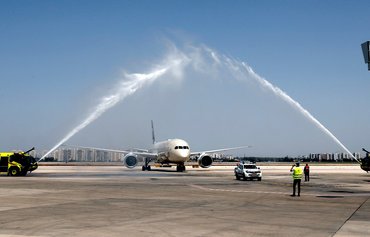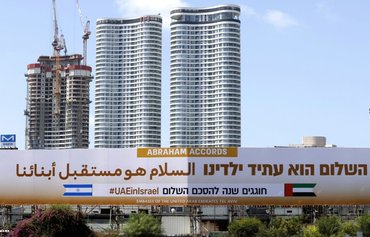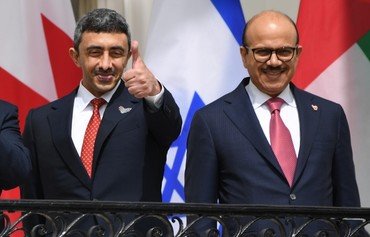The UAE on Thursday (March 11) announced it was setting up a $10 billion investment fund aimed at strategic sectors in Israel.
The two countries normalised ties last year.
The decision was taken following a "constructive" phone call between Abu Dhabi Crown Prince Sheikh Mohammed bin Zayed and Israeli Prime Minister Benjamin Netanyahu, Emirati news agency WAM reported.
"Through this fund, the UAE will invest in and alongside Israel across sectors including energy, manufacturing, water, space, healthcare and agri-tech," the official news agency said.
![Israeli tourists, mask-clad due to the coronavirus pandemic, visit al-Fahidi Historical Neighbourhood of Dubai on January 11. [Karim Sahib/AFP]](/cnmi_am/images/2021/03/12/28888-Israeli-tourists-UAE-600_384.jpg)
Israeli tourists, mask-clad due to the coronavirus pandemic, visit al-Fahidi Historical Neighbourhood of Dubai on January 11. [Karim Sahib/AFP]
"The investment fund will support development initiatives to promote regional economic co-operation between the two countries," it added.
The two governments also have entered into formal discussions to establish a quarantine-free travel corridor between the two countries.
The travel corridor, which would apply to passengers who are fully vaccinated against COVID-19, will facilitate travel for commercial, tourism and official purposes, WAM reported Wednesday.
Meetings between the foreign ministries of the two countries are currently under way to negotiate the terms of the agreement, with the aim of finalising and implementing the agreement in April.
Defence technology co-operation
Also on Wednesday, EDGE, the UAE's advanced technology group for defence, entered into an agreement with Israel Aerospace Industries to develop an advanced Counter-Unmanned Aircraft System (C-UAS).
The C-UAS integrates 3D radar, communications intelligence and electro-optic technologies into a unified command and control system that can perform a series of countermeasures, based on the level of threat and other factors.
Israel and the UAE established ties last year through a US-brokered agreement known as the Abraham Accords.
The deal made the UAE only the third Arab state to establish relations with Israel, following Egypt in 1979 and Jordan in 1994. Bahrain, Morocco and Sudan subsequently reached similar agreements.
These historical peace initiatives with Israel, as well as the rapprochement between Saudi Arabia and Qatar, have left Iran outside looking in, as it continues to obstinately support proxy groups that threaten the stability of Gulf states and the region.
"The [investment] fund builds on the historic Abraham Accord and aims to bolster economic ties between two of the region's thriving economies, unlocking investments and partnership opportunities to drive socio-economic progress," WAM said.
It said fund allocations "will derive from government and private sector institutions".

![Omer Goldstein of Team Israel Start-Up Nation pedals during the second stage of the UAE Cycling Tour on al-Hudayriyat Island on February 22. [Giuseppe Cacace/AFP]](/cnmi_am/images/2021/03/12/28887-UAE-Israel-biker-600_384.jpg)






